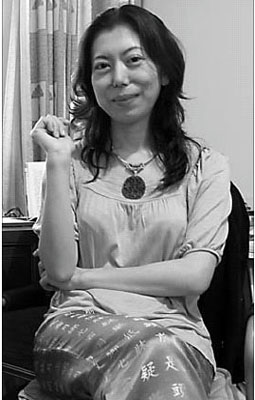Some people of Izumi Kyoka's age might feel ashamed about
borrowing money from their parents. But the 36-year-old Japanese
woman has to do it, even though she works hard.
Kyoka has translated six popular Chinese contemporary novels
into Japanese over the past five years, though none of them have
brought big paychecks and she is struggling to pay off her
debts.
Even so she doesn't regret doing her job.
"To be a translator is to become a reader with a deep
understanding of the book, and to enjoy it in a special way," she
says in her Beijing home, furnished neatly in a Chinese style, with
antique bookcases and a big wooden desk.
"I cannot make much money with book translations, but on the
other hand not many people take up the profession because of low
pay, so I can be outstanding in this field."
Kyoka studied Japanese literature at a woman's university in
Tokyo. In 1991, she participated in a one-month exchange program
and studied at the University of International Business and
Economics, in Beijing.
"I was fascinated to find how similar Chinese people look to us,
but how different their lives are."
Izumi Kyoka has translated
six Chinese contemporary novels into Japanese.
The part-time translator at People's China recalls Beijing was
experiencing a face-lift at the time. The combination of modern
high-rises and historical buildings attracted her and she rejoined
the program the following summer.
When she graduated in 1994, she decided to move to China, in
spite of opposition from her parents.
After studying Mandarin for two years, she started work at a
Japanese advertising company, in Beijing. After that she worked as
a freelancer for some Japanese magazines and newspapers.
It was difficult for her to find a suitable apartment, however,
because many Beijing landlords wouldn't rent their houses to a
foreigner. Eventually she found one without a gas supply and a
bathtub.
"For Japanese people, who are used to taking baths, the problem
could have been unbearable. But I was young and optimistic and
didn't worry on that account," she recalls with a smile.
In 2001, Kyoka met a Chinese author, Mao Danqing, who had lived
in Japan for more than a decade and took an active part in
Sino-Japanese cultural exchanges.
Impressed by her flowing and graceful Japanese writing style,
Mao asked her if she would translate Niu Niu (by Zhou
Guoping) into Japanese. It is a heartbreaking story about how the
author looked after his baby girl, who died of eye cancer at 18
months.
"I hesitated at first as I had never done such a thing before.
Then he told me something I would never forget: 'Translating a
Chinese book into Japanese doesn't depend on your level of Chinese,
it's about your ability to manage your native language and your
passion of the job.'"
So, she took up the challenge and threw herself into her
work.
Kyoka half-jokes that translating is like torturing the brain as
there are so many Japanese words for each Chinese character. She
often spends hours searching for exactly the right word. Accuracy
is the key, she says.
"I enjoy the torture because it has enabled me to discover more
about my mother tongue."
The Japanese edition of Niu Niu was published in 2003
and was warmly received. Her main targets are best-selling Chinese
books like Crazy like Wei Hui (Xiang Wei Hui Yiyang
Fengkuang by Wei Hui) and Spicy and Hot Three Kingdoms
(Shuizhu Sanguo by Cheng Junyi). Kyoka thinks these books are good
channels for Japanese people to understand what Chinese people are
thinking about.
Currently, she is finishing a translation of Brothers
(Xiongdi by Yu Hua) and will soon start on Double Mono
(Shuangsheng Shuimang, by Tian Yuan, a Chinese movie star).
According to Kyoka, in Japan, few Chinese books were available
at bookshops in the past and most of these were classics. Nowadays,
her works are available in many major bookshops.
She said the great advantage of translating books in China is
that she can meet up with the authors. Also, her Chinese friends
help her out, which she always appreciates.
"We make friends not because they want to learn Japanese from
me. Actually, they regard me as a Chinese person and keep me
company. They even arrange dates for me, which makes me nervous,"
she says, and laughs.
(China Daily December 20, 2007)


